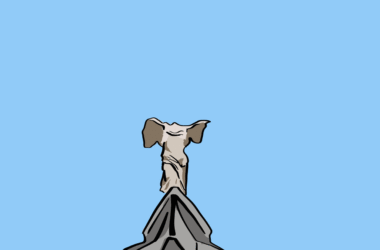 Simon Poitrimolt
Simon Poitrimolt
A talk by Dr. Tom Palmer on tyranny and oppression in North Korea on Feb. 7 was met with mixed reactions. Hosted by Libertarian McGill and the Institute for Liberal Studies, the speech focused on the nature and principles of freedom. Palmer, a senior fellow at Washington’s Cato Institute and vice president for international programs at the Atlas Economic Research Foundation, discussed his experiences from his 2010 trip to North Korea, and his expectations for the country’s future.
“People who say ‘here’s what’s going to happen’ are lying or deluded,” Palmer said. “I met a lot of North Korea specialists. I’m not one of them … but even the specialists say: ‘we don’t have a clue.'”
Palmer compared his understanding of North Korean society to the dictatorial regimes of Eastern Europe prior to the dissolution of the Soviet Union. According to him, the constant North Korean parades and other state functions are designed to make the individual a part of a ‘machine,’ which Palmer compared to the gears and dials in his watch.
Palmer used North Korea as an example for discussing the role and benefits of liberalism, commenting that “the rule of law is an element that cannot be overstated in its significance.” He also proposed that free trade is an important part of developing a country, and spent some time discussing the correlation between liberal values and socio-economic development.
A group of around fifty students, faculty members, and members of Libertarian McGill attended the talk. While several attendees expressed their appreciation for Palmer’s knowledge on the subject of liberalism, others had very different opinions.
Professor Jim Thomas, a visiting professor at McGill’s department of East Asian studies, felt that Palmer’s speech was troubling due to its emphasis on liberal values. Thomas also drew attention to Palmer’s factual inaccuracies, especially those surrounding the role of free trade in the development of the Republic of Korea, the causes and results of famines in North Korea, and the overall mindset of the leadership.
“By propagating the illusion of irrationality, instability, and changeability in [North Korea], we serve American and other international interests who benefit from those representations,” he said.
Thomas questioned Palmer’s assumption that it was impossible to predict the actions of North Korea, saying that the country will likely “remain more or less as it has over the last 70 years or more.”
In an email, Gregoire Legault, U3 honours East Asian studies and co-president of EASSA, also expressed concern about factual inaccuracies in Palmer’s talk and the McGill Libertarian Society’s choice to invite him to speak on the subject of the DPRK.
“The talk was reductionist at best [and] dangerous at worst, especially for the students who never had a chance to analyse North Korea from an academic perspective,” Legault said.
However, Matt Bufton, from the Institute for Liberal Studies, said that he had no problem with Palmer’s choice of subject or the critical discussion that stemmed from it.
“Our mission is to get people thinking and talking about ideas, so an engaged and curious audience is exactly what we like to see,” he said. “We knew that Dr. Palmer was well-versed in the history of freedom around the globe, and felt that his visit to North Korea would provide a starting point that would be current and of interest to McGill students.”
Adelle Archer, president of Libertarian McGill, said that she was satisfied with the event and that, to her, the most interesting part of the discussion hinged around the Sino-U.S. relationship regarding North Korea.
“The different scenarios [Palmer] outlined hit some important points, such as the undesirability of having South Korea expand north with U.S. troops,” Archer said. “[I was] delighted that challenging questions were posed, as they extracted informative and thought-provoking responses from Mr. Palmer.”





